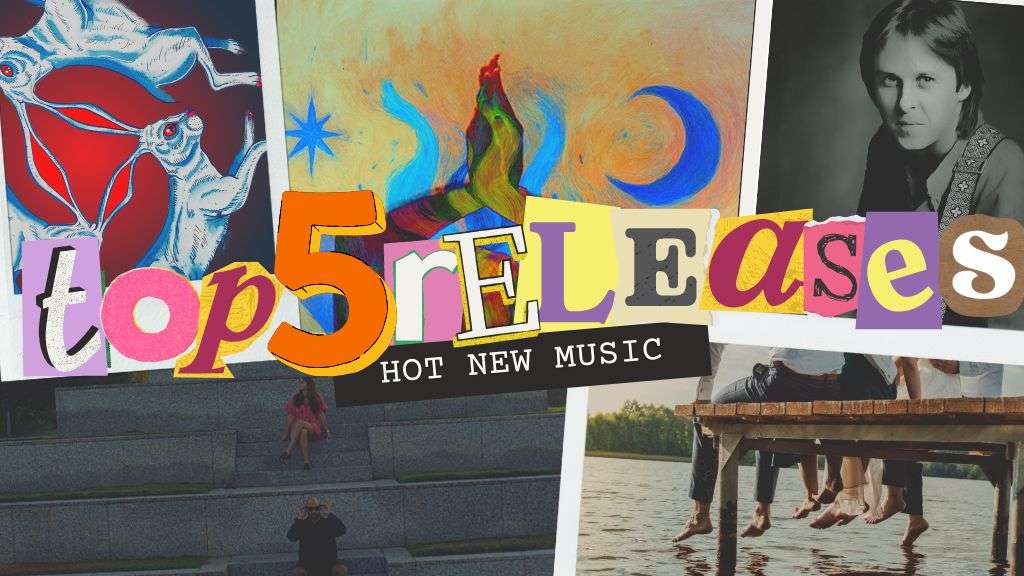Top 5 Releases 10-21-25

The following features are now included in our online magazine which is also available in print.
Issue #5
Online Magazine | Print MagazineFor more details contact us at: volechomag@gmail.com
Leo XIV: Dancing Through the Wreckage
Chicago's Leo XIV is not only dropping records, he's slowly luring himself out of the wreckage in front of our very eyes and making us hear the engine roaring back to life. His newest single Feel, the successor to his initial Midas, is the instant an artist comes to terms after years in hibernation. It starts as a 2 a.m. revelation at night and develops into something that sounds like the kind of track you'd hear when you're alone at the small hours when your mind is racing too energetically. Constructed around an unstoppable acid bass line which pulsates like an unstoppable heartbeat that you can't switch off, the track moves with a loose but determined pace, combining hypnotic grooves with vocals that are otherworldly yet optimistic. There's a low-key intensity at play here, the kind of tension you find in early The Weeknd singles or James Blake's most emotionally vulnerable moments.
Leo XIV, the work of Dylan Leo Azadi, is a declaration of vulnerability unvarnished. There is no legend-building at work here, merely one individual piecing himself together from depression, addiction and anxiety with melody as sustenance. He is not attempting to sound like he's been attuned to the cosmos, he is attempting to remain upright. Feel syncs with instinct, it begins in the dark and travels towards something more like light. Attempt to see it as nesting between Frank Ocean's Blonde in its introspection and FKA twigs' pulse-drunk shadowdance. This is music for the ones who've put themselves on pause and are now restoring play even if their hands still tremble. With sophomore release Cold Open due in 2026, Leo XIV is less interested in show and more interested in emotional accuracy. Feel isn't a song, it's the sound of a person reminding themselves that they're still there.
Shervin Boloorian: A Voice Built for Quiet Revolutions
My Free Heart, the new single from Iranian-born Bali-based musician and sound healer Shervin Boloorian, is the sort of song that doesn't compete for your attention, it settles in. His voice is positioned with a lived-in peace, as if defined by rest as much as action. He's not reaching for high drama or singles-list peak, but something more complex: peace that stays after the music ends. The English rendition carries a soft call, but the Persian rendition carries another level of emotional depth in putting the song in heritage and remembrance.
Boloorian's work has always broken the space between performance and healing space. His latest album I Hear You, Mother Earth won Global Peace Song Awards, and his Rumi-inspired album was blessed by Coleman Barks, a rare blessing from one who has experienced the power of words. But My Free Heart isn't religious drama. It's contemplative power in song, and it sounds less like a sweeping sermon and more like something you'd hear late in a movie from someone who sits alone in contemplation. If you enjoy the sensitivity of artists like José González or the calming rhythm of Trevor Hall, this song has the same feel.
Boloorian emerges from a location that does not seek the limelight but union. His international presence, from Balinese yoga rooms to off-the-radar performances overseas, has produced a sound that is never in haste. My Free Heart is a call to action to recall that tranquility can be paradoxical, particularly on a world that hardly pauses.
Deflecting Ghosts: Grit, Fury and the Will to Stand Up
Risen by Kansas-based Deflecting Ghosts features a fist-in-a-clenched-fist vibe around melody. It is a song that is constructed on urgency, a swift punch at complacency with lyrics that question the world's current deterioration and not some obliquely suggestive of same. You can sense the strains of alternative metal and rock running through the track, the unvarnished intensity of Breaking Benjamin's early days, the purging grit of Nothing More, and an attitude for endurance drawn from decades of tough-won strife.
The band didn't begin inside a high-sheen studio with an entourage of executives dictating their sound. It began as Luke Fitzgerald's fiefdom, his own thing, when his old band broke up, and grew into full-blown force when Rhema became the bass player and Austin joined as drummer. That these are songs penned in the home studio gives them insurgent credibility, this is rebellion chronicled through actual walls and small rooms, not factory-raised angst.
Recorded and processed with varying degrees of success by New Years Day's Jeremy Valentyne and Brandon Wolfe, Risen becomes a compromise of heaviness and clarity, delivering each emotional blow with accuracy. Rhema's basslines reverberate with spirals of pain reserve and determination, and Austin's drumming is savage, as if hammered out to rid something from inside, rather than to awe. If rock in its best should be akin to mutual survival, this group rides hard for that conviction.
For the fans who were missing when rock music was still human and got beat up, imagine Chevelle introspection with the ferocity of pre-millen Thrice, Risen reminds that heavy can be kind.
Stray Planets: Pop Fractals and Psychedelic Echoes
Are You Real, Cristobal Leedy? is not just an EP, it's experiencing a miniature cinema in someone's brain where every track warps the fabric of time. Dubliner John Butler, trading as Stray Planets, writes like he's splicing scenes of 60s psychedelia, shoegaze-washed dream sequences and latenight indie film together. The result is a five-track experience that feels both warped and strangely familiar, like an old record you’re sure you’ve heard before but can’t place.
Working once again with producer Rían Trench, Butler elevates his cult reputation with something deeply imaginative. Your Revolution opens with an era-bending shoegaze wash that questions whether machines will ever feel rebellion the way humans do. Hallucinations, with the lead vocals of Gilla Band's Dara Kiely, is like an AI breakdown viewed on a malfunctioning TV screen. Interlude Cristobal Leedy drifts on self-doubt, recalling that weird YouTube-comment experience where the person has a compliment for your work and you're left wondering if they even exist. Salvia twists through a Capel Street 3 a.m. fever dream. And Artificial Love ends in bittersweet glamour, questioning if synthetic affection is at times easier than actual connection.
Vinyl Williams, Jacco Gardner or the spaced-out goofiness of early Ariel Pink supporters will be equally entranced. Butler isn't guru or hero figure, just a guy in pursuit of sound that is half-forgotten, half-dreamed. This EP would be scored just as stunningly for an A24 film or some quirky special effects sci-fi love tale where love is a little too robotic and a little too material all at once.
Rose Ringed: Euphoria Written in Mourning
Mylène, the first album by Amsterdam producer, drummer and jazz pianist Rose Ringed, is one of those albums defined by loss but filled with motion. A tribute to his mother, a jazz ballerina who died when he was 11, the album is both despair and illumination — grief turned into rhythm instead of stagnation. Where others would keep quiet in sorrow, Rose channelled catharsis through ecstatic electronic melody, building tracks that blaze and pulse with the resolve of one dancing through pain, not staying in it.
Rose Ringed's music is an emotional intensity mixed with dance-biability drawn from the freedom of trance and the block-by-block narrative of producers such as Bicep and Paul Kalkbrenner. It is not dance music per se, it is memory in arpeggio and chord progression listenable like latenight therapy sessions. You can sense the imprint of early reference points such as Enya and Hans Zimmer under the beat, which lends even the more forceful parts some gravity.
His path from drummer to jazz pianist to producer lends the music form and improvisational spirit. The fact that his ascension has reached as high as events such as Tomorrowland, Loveland and ADE only goes to show how this emotional authenticity speaks far and wide. Mylène is a man who senses he is finally hitting at the heart of what drives him, not ambition, but heritage.
Rose doesn't attempt to do tragedy. He's turning it into gasoline. It's the sort of record you play past midnight, when memory aches but the rhythm sweeps you along.
Follow Our Playlist For More Music!
